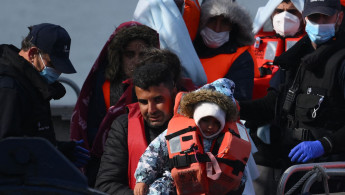English Channel boat crossings increased by 300% in 2022: charity
The number of refugees and migrants attempting to cross the English Channel by boat has reached a record high in 2022, a charity providing aid to migrants has said.
Nearly 6,700 successful crossings have been recorded from the beginning of the year until April 19, four times more than in 2021 at the same date.
Over the first four months of this year, the French non-profit Utopia 56, which provides emergency aid to migrants at the French-English border, received at least 36 calls from people in distress at sea compared to 59 calls over the entire year 2021.
"In most cases, after being rescued, people are abandoned in the ports without any help from the [French] state," the organisation said in a statement.
In July 2021, the UK Home Secretary and French Interior ministry signed a £54.2 million ($74.2 million) deal agreeing to fund an increase in enforcement officers and surveillance technology along the French coastline.
Local activists say the measures are counter-productive and fail to meet the needs of migrants, who are pushed to take ever greater risks at sea.
"Over-militarization of the northern coast [of France] leads to higher risks being taken, departures take place earlier in the year despite violent winds, a cold and difficult sea," said Marguerite Combes, the coordinator of Utopia 56 in Calais.
The deadliest disaster since the Channel became a major part of the migrant route was recorded in November, when at least 31 migrants drowned in the sinking of their boat off the port of Calais.
Sea crossings to Britain continue to take place despite the UK announcing contentious proposals to send those who cross the Channel thousands of miles away to Rwanda.





 Follow the Middle East's top stories in English at The New Arab on Google News
Follow the Middle East's top stories in English at The New Arab on Google News


